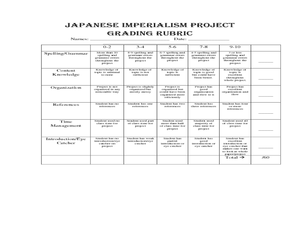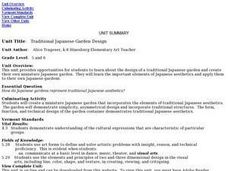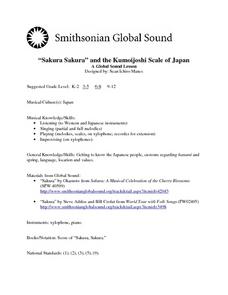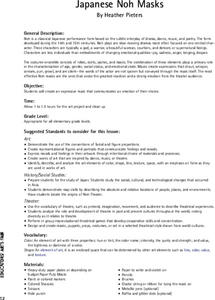Curated OER
Japanese Tea and Teacups
Upper graders use the potter's wheel to make Japanese style tea cups, which they will use in a Japanese style tea ceremony. They hone their sculpting techniques while exploring Japanese cultural and the history of tea. There are two...
Curated OER
The Art and History of Japanese Calligraphy
Chinese and Japanese calligraphy is beautiful and significant in both culture and tradition. Engage your class in this expressive fine art form through a lesson on using, holding, and creating brush strokes common to Japanese writing...
Curated OER
Integrating Japanese Folk Tales into the Classroom Using Japanese Kamishibai
Students study Japanese folk tales focusing on the traditional values and key elements. They compare the Japanese values with their own. They discuss Japanese art before designing a set of kamishibai on which they write a summary of a...
Curated OER
Japanese Fan
Learners discuss Japanese culture and the functional and artistic uses of fans and create paper fans using watercolors, popsicle sticks, and tape in this Art lesson plan for the elementary classroom. Can be used as an introduction to...
Curated OER
The Tale of Genji
Did you know that the world's first novel was written by a woman? Murasaki Shikibu's The Tale of Genji, was published in 1021. Class members research Eastern and Western cultures in the 10th and 11th centuries, view modern adaptations of...
Curated OER
Japanese Abstract Art And The Impressionist Movement
Students study several examples of Japanese abstract art and how this style impacted the Impressionist movement of the 19th century. This instructional activity includes ideas for student-created sketchbooks.
Curated OER
The Japanese Empire: The Beginning
Ninth graders explore empires by researching Japan's history. In this Japanese research lesson, 9th graders discuss the history of Japan and the elements of World War II that caused Japan to become an enemy of the United States. Students...
Curated OER
Shinto, Stones, and the Garden
Students examine how Shinto and Buddhism are reflected in the Japanese art and life-style, especially as seen in the relationship people have with the land (gardens). This lesson is for the elementary classroom.
Curated OER
Arts of Asia in Reach
Students explore the traditions and celebrations of another culture and research a city or community in Japan. They then examine traditional Japanese music as well as practice several dance steps and discover their significance in...
Curated OER
You Too Can Haiku: How to Write a Haiku
Students explore language arts by writing their own poems. For this haiku lesson, students investigate the Japanese culture and their beautiful music, poetry and art. Students count the syllables in every line of a haiku poem and write...
Curated OER
Origami Paper Fun
Students explore the art of Origami. They listen to various stories about Japan, create Origami shapes by following step-by-step directions, sing Japanese songs, locate Japan on a map, and take a quiz.
Curated OER
Traditional Japanese Garden Design
Students create a miniature Japanese garden that incorporates the elements of traditional Japanese aesthetics. They study the simplicity, asymmetrical design and incorporate traditional structures.
Curated OER
Incorporating Japanese Music into the Music Classroom
Fourth graders experience the music and arts of Japan as they explore the language and culture of the country in this lesson. A variety of musical elements from the culture are demonstrated.
Curated OER
Foods and Languages of the World
Students explore Japan. For this Japanese culture lesson, students listen to stories regarding Japan, view Japanese art, learn Japanese words, and make Origami.
Curated OER
Food and Languages of the World
Students examine Japanese culture. In this multicultural lesson, students taste rice crackers and create Japanese fans from paper and paint.
Curated OER
"Sakura Sakura" and the Kumoijoshi Scale of Japan
Students listen to a recording of "Sakura" and determine where it is from. In this global sound instructional activity, students view pictures of cherry blossoms and connect its significance to Japanese culture. Students sing the score...
Curated OER
Sakura
Students create, notate, and perform the melody of and a rhythmic accompaniment to the traditional Japanese folk song, Sakura. This instructional activity requires a networked computer lab with headphones.
Curated OER
Japanese Noh Masks
Young scholars examine Japanese theatre and create their own face masks which display certain emotions, props, costumes and perform in improvisational theatrical games.
Curated OER
"Open Mic" - Giving Creative Expression To The Connection Between The Japanese American Internment, September 11, And Our Rights Today
Students explore the similarities of the Japanese-American experience in WWII and Arab-American experience in post-September 11 US policy. They create presentations on their reflections and express themselves through poetry, dance,...
Curated OER
Japan and Art
Students discuss the art of Japan as it relates to Japanese culture and geography and then create individual postcards reflecting the information learned from the lesson. This lesson includes possible enrichments.
Curated OER
Japanese Family Crests
Students create an artistic crest that represents either themselves, their group of friends, or their their family.
Curated OER
Flora, Fauna, and the Passing Seasons
Students discover representations in art, religion and cultural practices of the flora and fauna of specific geographical regions in this early elementary lesson plan. The lesson ends with a mural project by the entire class.
Curated OER
Nature and Haiku Poetry
Students compose haiku poems and recognize how cultures value nature and
natural forces through the study of Japanese poetry. This lesson includes a bibliography of resources.
Curated OER
Noh Theater
Students explore the roles in Noh drama and the significance of Noh masks while creating their own version of a Noh play in this High School lesson adaptable for either the Language Arts or Theater classroom.

























